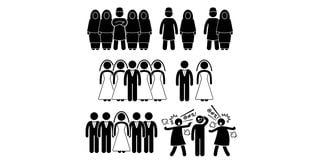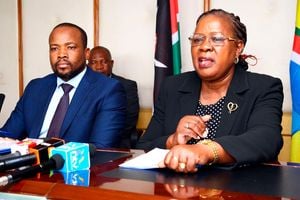Man seeks polygamy rights for wedded Christians

The number of married Kenyan women who are co-wives has declined significantly.
What you need to know:
- Ndura, 78, is the author of the widely discussed book "Polygamists Will Also Go to Heaven”.
- He blamed monogamy for the rising rates of single parenthood and divorce.
A Kitale businessman is seeking legal recognition of polygamy in Christian marriages and wants the High Court in Kenya to allow Christians to marry more than one wife.
He sought the prayers in a landmark constitutional petition expected to spark a conversation on Christian religious freedoms and bigamy in Kenya and across the world.
High Court Presiding Judge Justice Antony Mrima is hearing the petition filed by social commentator Bonface Koimburi Ndura, who has challenged the Marriage Act of 2014, which restricts legally married men from practicing polygamy.
The petition is expected to trigger a conversation on religious freedom, constitutional rights, and the legal interpretation of marriage in Kenya.
Ndura, 78, is a strong advocate of polygamy and author of the widely discussed book "Polygamists Will Also Go to Heaven”.
He has petitioned the court challenging specific provisions of the Penal Code and the Marriage Act, arguing that the legal imposition of monogamy in Christian marriages is unconstitutional, as it violates the religious freedoms and rights of those who practice or believe in polygamy based on their interpretation of the Bible.
Through his lawyer Dennis Mutaki Wanyama, he is seeking official recognition of polygamy as a legitimate form of marriage for Christians who interpret their religious beliefs to support the practice, thus expanding the legal definition of marriage to be inclusive of both monogamous and polygamous unions.
According to the petitioner, banning polygamy has significantly contributed to rising rates of single parenthood and divorce in Kenya. He views polygamy as a solution to these social challenges, offering what he calls a “more stable family structure” in certain communities.
Mr Koimburi, who married Anne Nduta in a church ceremony at Thigio Catholic Mission Church on February 10, 1973, in present-day Kiambu County, feels he has been denied the opportunity to marry the woman with whom he has fathered children and supports outside the framework of marriage.
Penal code
In his petition, he challenges Section 171 of the Penal Code and Sections 6, 8, 9, and 11 of the Marriage Act, which upholds monogamy in Christian marriages, effectively prohibiting polygamy for Christians.
The petitioner contends that the provisions violate the religious rights of Christians who, based on biblical teachings, support the practice of polygamy.
According to the polygamy advocate, these provisions not only violate Article 32 of the Kenyan Constitution, which protects freedom of religion and belief but also infringe upon Article 45, which guarantees the right to marry and find a family based on personal convictions.
Specifically, he highlights how the laws disproportionately affect Christians as other religious communities, such as Muslims, are allowed by law to practice polygamy.
"Key provisions in the Penal Code and the Marriage Act unfairly impose a restrictive model of marriage on Christians, while other religious communities, such as Muslims, are legally allowed to practice polygamy," he told Nation. Africa.
“This distinction creates an unequal legal environment that infringes on the constitutionally protected rights of Christians to freely interpret their religious texts and practices,” he argues.
In effect, the petitioner is seeking several critical declarations from the court, among them a declaration that Section 171 of the Penal Code and sections 6, 8, 9, and 11 of the Marriage Act are unconstitutional, as they infringe upon the religious freedoms of Christians who practice or support polygamy.
Section 171 of the Penal Code states that "A person who, having a husband or wife living, goes through a ceremony of marriage that is void due to occurring during the lifetime of their spouse is guilty of a felony and is liable to imprisonment for five years”.
The petitioners want a court order to remove or amend these provisions to allow polygamous marriages within Christian contexts, ensuring parity with other religious communities, such as Muslims, who are permitted to practice polygamy under Kenyan law.
"This move would create legal parity between Christian and Muslim communities, where polygamy is already recognized. Many monogamous Christian men secretly have additional partners, but cannot disclose them for fear of legal implications," he says.
According to his lawyer Wanyama , the petition is grounded in Article 32 of the Constitution, which protects freedom of religion, belief, and opinion.
Mr Koimburi argues that the imposition of monogamy in Christian marriages restricts the freedom of those Christians who believe polygamy is permitted by their faith.
“Article 45, which deals with the right to marry and found a family, is also central to the petition. The petitioner argues that these provisions unfairly limit the choice of marriage structure for Christians, thereby infringing on their right to marry in accordance with their religious convictions,” his lawyer said.
According to Ndura, these provisions not only violate Article 32 of the Constitution, which protects freedom of religion and belief, but also infringe upon Article 45, which guarantees the right to marry and find a family based on personal convictions.
The petition further draws biblical and theological arguments, with the polygamy activist drawing on various biblical figures Abraham, Jacob, David, and Solomon who practiced polygamy without divine condemnation, as evidence that polygamy has historical and theological roots in Christianity.
He asserts that at no point in the Bible did God condemn these figures for practicing polygamy, and that God assigned them critical roles in the biblical narrative, which implies divine acceptance of the practice.
"The modern legal imposition of monogamy is a colonial relic that contradicts traditional Christian teachings," argues the social commentator and environmentalist who is popular for domesticating animals with deformities.
Doctrinal imposition
His lawyer says his client contends that the modern enforcement of monogamy is a doctrinal imposition that does not align with the original teachings of Christianity.
“He references numerous biblical passages to support his argument that polygamy was historically accepted and that its prohibition is a relatively recent development influenced by European and colonial ideals rather than Christian doctrine,” Mr Wanyama said.
The petition also highlights the social problems that arise from the imposition of monogamy in Christian marriages, with Mr Koimburi arguing that the enforcement of monogamy has contributed to the rising number of single mothers, fatherless children, and high divorce rates.
He presents polygamy as a solution to the social ills, suggesting that it provides a more stable family structure for certain communities.
“The petitioner believes that by legally recognizing polygamy, the government could mitigate many of these social challenges, as it would offer an alternative family model that is in harmony with natural law and human biology,” his lawyer said.
His lawyer says the petition has the potential to significantly alter Kenya’s legal and social landscape, particularly concerning marriage laws.
If successful, it could see a broader legal interpretation of marriage in Kenya, allowing for religiously motivated polygamous unions in Christian communities, and a re-evaluation of the relationship between church and state in the regulation of marriage.
It could also see a potential shift in societal attitudes towards polygamy, particularly within Christian communities where it has long been stigmatized.
High Court Judge Justice Antony Mrima is expected to give directions on the petition will give directions on the matter on October 7, 2024.
By Wednesday the office of the Attorney General had not filed its response to the petition, and Mr Wanyama told Nation.Africa that they are waiting for the court pronouncement on the matter regardless of the AG’s reply.
“We are waiting to see if there are interested parties or Amicus Curio that would seek to be enjoined on the matter before the court before the set date. We expect the court to be fair to the petitioner’s prayers,” the lawyer said.
Various religious organizations through the National Council of Churches of Kenya (NCCK) have informally expressed interest in the case which is expected to challenge the doctrine that promotes monogamy among their members, although none is yet to formally seek to be enjoined.





